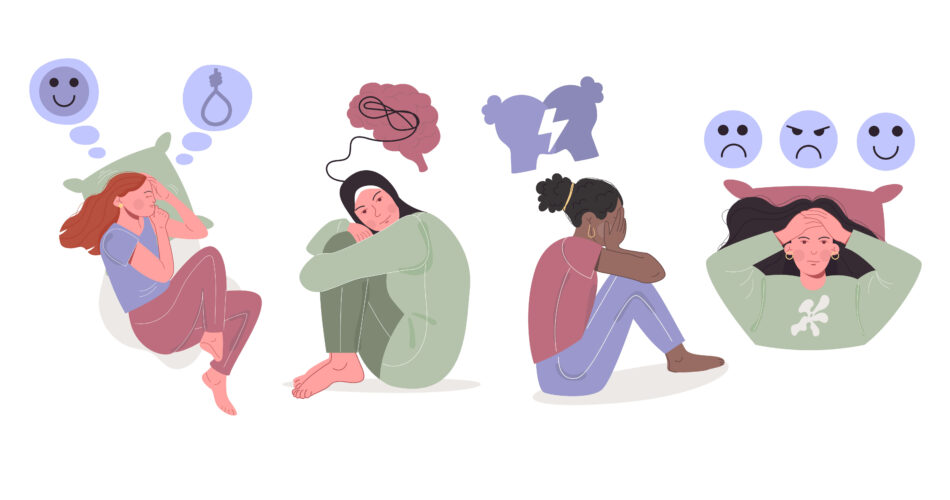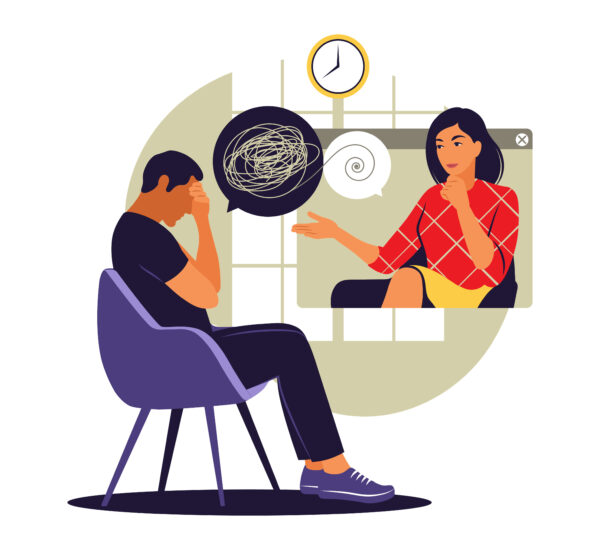A mental disorder like bipolar disorder is a type of depression that most people don’t understand. The idea of shifting emotions or sudden mood changes has been a normal indication of most types of depression. However, there are certain bipolar disorder symptoms that should be monitored. With the confirmed presence of such signs, it is best to recognize them immediately.
It is understandable that most people can’t differentiate the distinct bipolar disorder symptoms. Fortunately, this blog can provide assistance. Discover the warning signs about this depression type and learn why their occurrence can be alarming. Let’s find out more about this mental health disorder today!
Defining Bipolar Disorder

Bipolar disorder, also known as a manic depression illness, is a chronic mental health condition that causes dramatic mood swings. These mood swings can range from emotional highs, known as manic episodes, to depressive lows. These shifts in mood can occur suddenly or gradually and can last for days, weeks, or even months.
The exact cause of bipolar disorder is not yet fully understood. However, researchers believe that it is a combination of genetic, biological, and environmental factors. Imbalances in certain brain chemicals, such as neurotransmitters, also play a role in the development of bipolar disorder.
The Science Behind Bipolar Disorder
Studies have shown that people with bipolar disorder have differences in brain structure and function compared to those without the condition. These differences are most prominent in the prefrontal cortex, amygdala, and hippocampus, which are areas of the brain responsible for regulating emotions, decision-making, and memory.
Researchers have discovered that during manic episodes, there is an overactivation of the prefrontal cortex, leading to increased symptoms of mania like impulsivity and risk-taking behavior. On the other hand, during an episode of depression, there is reduced activity in the prefrontal cortex, resulting in feelings of sadness, hopelessness, and difficulty concentrating. Furthermore, studies have found that individuals with bipolar disorder have an increased sensitivity to stress. This heightened stress response can further exacerbate mood swings and contribute to the development of the disorder.
Take note that these noticeable changes can be classified as the bipolar symptoms. These symptoms of a manic episode or severe episode of depression that can be manic episodes, it can be determined as
Different Types of Bipolar Disorder

There are several types of bipolar disorder, each with its unique features. These bipolar disorder types are important to understand as some types may provide less alarming, while others may offer severe episodes. Thus, making them a crucial aspect to recognize and differentiate to attain the suitable form of treatment.
Let’s discuss each of them below and get to know more about such types of bipolar disorder!
- Bipolar I Disorder: This is the most severe form of bipolar disorder, characterized by manic episodes that last at least seven consecutive days. Depressive episodes may also occur, typically lasting for two weeks or more. During manic episodes, individuals may experience an inflated sense of self-esteem, decreased need for sleep, racing thoughts, and reckless behavior.
- Bipolar II Disorder: This type involves recurring episodes of hypomania, a less severe form of mania, along with depressive episodes. Hypomanic symptoms are characterized by increased energy, heightened creativity, and a euphoric mood. However, these episodes are not as severe as manic episodes and do not significantly impair daily functioning.
- Cyclothymic Disorder: Individuals with this type of bipolar disorder experience numerous periods of hypomania and mild depression that last for at least two years. These mood swings are less severe than those seen in bipolar I and II disorders but can still have a significant impact on daily life.
- Other Specified and Unspecified Bipolar and Related Disorders: These categories include individuals who do not fit into the above types but still experience significant mood swings and related symptoms. This may include individuals with rapid cycling bipolar disorder, where they experience four or more mood episodes within a year, or individuals with bipolar disorder caused by a medical condition or substance abuse.
It is important to note that bipolar disorder is a complex condition that can vary greatly from person to person. The severity and frequency of the mood symptoms, as well as the specific bipolar symptoms experienced, can differ significantly between individuals. Proper diagnosis and treatment are crucial in managing bipolar disorder.
Recognizing the Bipolar Disorder Symptoms
As mentioned, recognizing the symptoms of bipolar disorder is crucial for early diagnosis and effective management. Just like any other mental health disorder, monitoring the signs are vital for better managing of the condition. Bipolar disorder can manifest differently in each individual. There are cases wherein manic episodes and depressive episodes can occur, which both can be considered as bipolar disorder symptoms.
Let’s uncover the bipolar symptoms below!
Manic Episodes and Their Indicators

During a manic episode, individuals with bipolar disorder may exhibit a range of behaviors and emotions that can be intense and disruptive. Some indicators of a manic episode include:
- Increased energy levels and activity, often leading to impulsive or reckless behavior
- Feelings of euphoria or extreme irritability, which can strain relationships with others
- Racing thoughts and rapid speech, making it challenging to focus or communicate effectively
- Decreased need for sleep, sometimes resulting in insomnia without feeling tired
- Engaging in risky behaviors, such as reckless spending, substance abuse, or engaging in dangerous activities
These bipolar disorder symptoms can significantly impact an individual’s daily life, relationships, and overall well-being, underscoring the importance of timely intervention and support.
Depressive Episodes and Their Signs
Conversely, depressive episodes in bipolar disorder can be debilitating and overwhelming, affecting a person’s mood, thoughts, and behavior. Recognizing the signs of a depressive episode is crucial for providing appropriate care and assistance. Common symptoms of depressive episodes include:
- Profound fatigue and loss of energy, making even simple tasks feel exhausting
- Difficulty concentrating and making decisions, leading to challenges in work, school, or daily activities
- Changes in appetite and weight, with some individuals experiencing significant weight loss or gain
- Sleep disturbances, such as insomnia or oversleeping, disrupting the natural sleep-wake cycle
- Thoughts of death or suicide, indicating the severity of the depressive episode and the need for immediate professional help
It is important to note that the severity and duration of these bipolar disorder symptoms can vary between individuals and episodes, highlighting the complex nature of bipolar disorder and the necessity for personalized treatment approaches.
The Impact of Bipolar Disorder on Daily Life

Living with bipolar disorder involves navigating a complex interplay of emotions, energy levels, and cognitive functions. Individuals may find themselves oscillating between manic episodes and depressive episodes. These fluctuations can not only affect personal well-being but also influence interactions with others. Thus, affecting the everyday life of the patient.
Bipolar Disorder and Relationships
In the context of relationships with family, friends, and others, bipolar disorder can also hinder patients from maintaining stable relationships with them. Due to the unpredictable mood swings associated, the extreme shifts in mood and energy levels can strain communication, intimacy, and trust between people.
Moreover, the stigma surrounding mental health conditions like bipolar disorder can further complicate relationships. Misconceptions and judgments from others may create barriers to forming and sustaining meaningful connections. That’s why it is important to have a strong support system that can help you navigate your way throughout the bipolar disorder challenges.
Bipolar Disorder and Professional Life
On the other hand, individuals with bipolar disorder symptoms that they can’t manage can have a difficult time balancing their professional life. The bipolar episodes are unpredictable, which can impact the individual’s ability to perform their duties in their workplace. In short, patients with bipolar disorder can’t function fully, which means it is important to have open communication with the supervisors and colleagues at work. Doing so can help individuals with bipolar disorder maintain fulfilling careers.
When and How to Seek Help for Bipolar Disorder
Recognizing When Help is Needed
If you or a loved one experiences significant shifts in mood, energy, or behavior that interfere with daily functioning, it may be a sign of bipolar disorder. These shifts can range from periods of intense euphoria and high energy (known as manic episodes) to periods of extreme sadness, hopelessness, and low energy (known as depressive episodes). Other indicators of bipolar disorder may include a sudden increase in risky behaviors or thoughts of self-harm. It is important to recognize these signs and seek help from a mental health professional for proper diagnosis and treatment.
Steps to Take for Seeking Help
- Educate Yourself: Learn about bipolar disorder to gain a better understanding of the condition and its treatment options. There are numerous resources available, including books, websites, and support groups, that can provide valuable information and insights.
- Reach Out to a Professional: Consult with a mental health professional, such as a psychiatrist or psychologist, who specializes in mood disorders. These professionals have the expertise to accurately diagnose bipolar disorder and develop an appropriate treatment plan tailored to your specific needs.
- Keep a Mood Journal: Track your moods, energy levels, and any triggers or patterns you notice. This information can be invaluable during the diagnostic process, as it provides a comprehensive picture of your symptoms and helps healthcare providers make informed decisions about your treatment.
- Follow Treatment Recommendations: Work closely with your healthcare provider to develop an individualized treatment plan that may include medication, therapy, and lifestyle modifications. It is important to adhere to the recommended treatment plan and communicate any concerns or side effects to your healthcare provider.
- Build a Support Network: Surround yourself with a supportive network of friends, family, and support groups who can provide encouragement and understanding. Having a strong support system can make a significant difference in managing bipolar disorder and promoting overall well-being.
Remember, seeking help for bipolar disorder is a courageous step towards taking control of your mental health. With proper diagnosis, treatment, and support, individuals with bipolar disorder can lead fulfilling and meaningful lives. Don’t hesitate to reach out and seek the help you deserve.
Treatment Options for Bipolar Disorder

Fortunately, there are various treatment options available to help individuals manage mental health symptoms like the bipolar disorder symptoms. These treatment options are equally essential for managing this mental disorder. However, determining the most suitable treatment can only happen if you have consulted with a mental health doctor.
To have an idea of the possible treatment options that the doctor might provide, let’s discuss them below!
Medication Management for Bipolar Disorder
Medications are commonly prescribed to stabilize mood swings and manage symptoms associated with bipolar disorder. These may include mood stabilizers, antipsychotics, and antidepressants. It is essential to work closely with a psychiatrist to find the most effective medication regimen for each individual’s unique needs.
Psychotherapy and Bipolar Disorder
Psychotherapy, such as cognitive behavioral therapy (CBT) and interpersonal therapy (IPT), can provide individuals with bipolar disorder with valuable coping strategies, emotional support, and education about the condition. Therapy sessions can help individuals identify triggers, develop healthy coping mechanisms, and manage stress more effectively.
Conclusion
Understanding bipolar disorder symptoms is key to recognizing the signs and seeking help when needed. This chronic condition can impact numerous aspects of an individual’s life, but with the right support and treatment, individuals with bipolar disorder can lead fulfilling lives. If you or someone you know is struggling with bipolar disorder, reach out to a mental health professional for assistance today. Book an online consultation with a psychiatrist today!
Bipolar Disorder Knowledge Quiz
Test your understanding of bipolar disorder symptoms
What is another name for bipolar disorder?
Explanation
Bipolar disorder is also known as manic depression illness. It is a chronic mental health condition that causes dramatic mood swings ranging from emotional highs (manic episodes) to depressive lows.
How long must manic episodes last to be classified as Bipolar I Disorder?
Explanation
Bipolar I Disorder is the most severe form, characterized by manic episodes that last at least seven consecutive days. Depressive episodes may also occur, typically lasting for two weeks or more.
Which of the following is NOT a symptom of a manic episode?
Explanation
Profound fatigue and loss of energy is actually a symptom of depressive episodes, not manic episodes. Manic episodes are characterized by increased energy, racing thoughts, decreased need for sleep, and engaging in risky behaviors.
What type of bipolar disorder involves hypomania (a less severe form of mania) along with depressive episodes?
Explanation
Bipolar II Disorder involves recurring episodes of hypomania (a less severe form of mania) along with depressive episodes. Hypomanic symptoms include increased energy and heightened creativity, but these episodes do not significantly impair daily functioning.
Which brain areas show differences in people with bipolar disorder?
Explanation
Studies have shown that people with bipolar disorder have differences in the prefrontal cortex, amygdala, and hippocampus. These areas are responsible for regulating emotions, decision-making, and memory.
Great Job!
You have a good understanding of bipolar disorder symptoms.

